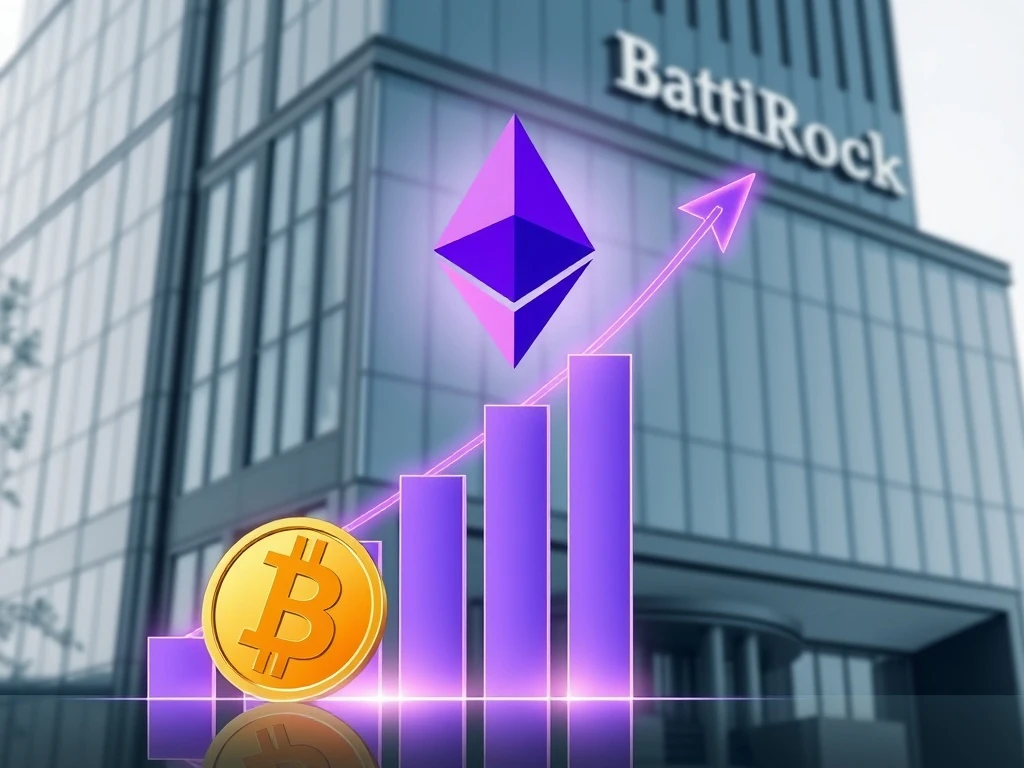Ethereum ETF Dominates: BlackRock’s ETHA Surpasses Bitcoin ETF with Unprecedented $6.4 Billion Institutional Inflows

The cryptocurrency landscape is witnessing a seismic shift, and the latest headlines confirm what many analysts have predicted: institutional money is increasingly flowing into **Ethereum ETFs**. This isn’t just a minor blip; it’s a significant re-evaluation of digital asset portfolios by major players, spearheaded by none other than financial titan BlackRock.
Ethereum ETF Dominance: Is This a New Era for Crypto Investments?
In a truly remarkable turn of events, BlackRock’s Ethereum ETF (ETHA) has not only captured the market’s attention but has decisively surpassed its Bitcoin ETF (IBIT) in weekly inflows. This signals a notable shift in institutional investor preferences, moving beyond Bitcoin’s established position to embrace Ethereum’s multifaceted utility. As of July 25, 2025, ETHA reported an impressive 14-day consecutive inflow streak, a momentum Bitcoin ETFs struggled to replicate, even with a brief rebound.
The sheer scale of this shift is astounding: the **Ethereum ETF** has attracted a staggering $6.4 billion in total inflows over just 11 weeks. This demand is primarily driven by institutions seeking diversified crypto exposure, recognizing Ethereum’s growing appeal as a foundational asset for decentralized finance (DeFi) and smart contracts. Analysts highlight these functionalities as key differentiators from Bitcoin’s primary role as a store of value.
Why is BlackRock ETHA Leading the Charge?
The rapid growth of **BlackRock ETHA** is a testament to its appeal. The fund’s assets under management (AUM) surged to $10 billion by July 25, doubling its $5 billion level recorded earlier in July. This explosive performance has positioned ETHA as the second-largest inflow ETF in the U.S., trailing only the Vanguard S&P 500 ETF. This trajectory reflects broader market dynamics, with Ethereum ETFs attracting $4.4 billion in July alone, a figure that remarkably exceeds inflows from the previous 12 months combined.
BlackRock’s strategic focus on Ethereum is further underscored by key personnel movements, including the departure of its Head of Digital Assets to an Ethereum-focused treasury firm. Analysts interpret this as a strong sign of confidence in Ethereum’s long-term potential and its role in the institutional investment landscape.
What’s Driving These Massive Institutional Crypto Inflows?
The pivot towards Ethereum by institutional investors is not arbitrary; it’s rooted in fundamental value propositions. Unlike Bitcoin, which is primarily seen as digital gold, Ethereum offers a robust ecosystem for smart contracts and decentralized applications. This functionality unlocks a vast array of use cases, from DeFi protocols to NFTs and enterprise solutions, making it a more dynamic and versatile asset for sophisticated portfolios.
The sustained **institutional crypto inflows** into Ethereum-based products are a clear indication that major players are prioritizing assets with expanding utility. Ethereum’s ongoing network upgrades (like the upcoming Pectra upgrade) and evolving treasury dynamics further enhance its long-term viability as an institutional-grade asset. Investors are seeking not just exposure to crypto, but exposure to innovation and growth within the digital economy.
Bitcoin ETF Comparison: Are We Witnessing a Power Shift?
While Ethereum ETFs have been on an uninterrupted ascent, Bitcoin ETFs, including BlackRock’s IBIT, have faced challenges. They endured three consecutive days of outflows before a modest $226 million institutional inflow on July 24. However, this pales in comparison to Ethereum’s sustained momentum, with its 13-day inflow streak (as of July 11) remaining unmatched.
This **Bitcoin ETF comparison** highlights a significant recalibration of risk preferences among institutional investors. Bitcoin retains its dominance in market capitalization, but its market dominance has seen a 5% dip this year. This suggests that investors are balancing their exposure between established crypto segments and emerging, utility-rich assets like Ethereum. The market is maturing, and diversification is becoming a key strategy for navigating the digital asset space.
How Will This Broader Crypto Market Shift Impact Your Portfolio?
The sustained institutional interest in Ethereum ETFs suggests a fundamental **crypto market shift**. This trend indicates a growing recognition of Ethereum’s unique value proposition beyond just being a digital currency. Its role as the backbone of the decentralized web positions it as a critical component for future technological and financial innovation.
For individual investors, this shift underscores the importance of understanding the distinct roles of different cryptocurrencies. While Bitcoin remains a strong store of value, Ethereum offers exposure to a rapidly expanding ecosystem of decentralized applications and financial services. The 14-day inflow streak for Ethereum ETFs as of July 24 is a powerful indicator, with analysts noting the fund’s role in accelerating Ethereum’s adoption within institutional portfolios. This evolving landscape suggests a future where diversified crypto holdings, balancing both store-of-value and utility-driven assets, become the norm.
This unprecedented surge in Ethereum ETF inflows, led by BlackRock, marks a pivotal moment in the cryptocurrency market. It signifies a maturation of institutional investment strategies, moving towards assets that offer both stability and profound utility. As Ethereum continues to evolve and expand its ecosystem, its appeal to sophisticated investors is only set to grow, potentially reshaping the entire digital asset landscape for years to come.
Frequently Asked Questions (FAQs)
What is an Ethereum ETF?
An Ethereum ETF (Exchange-Traded Fund) is an investment vehicle that allows investors to gain exposure to the price movements of Ethereum without directly owning the cryptocurrency. It trades on traditional stock exchanges, making it accessible to a broader range of investors, including institutions.
Why are institutional investors choosing Ethereum over Bitcoin now?
While Bitcoin is primarily valued as a store of value (digital gold), Ethereum offers greater utility through its smart contract functionality and robust decentralized finance (DeFi) ecosystem. Institutional investors are increasingly seeking diversified exposure to assets with real-world applications and growth potential beyond just price appreciation.
What does BlackRock’s ETHA performance mean for the crypto market?
BlackRock’s ETHA outperforming its Bitcoin ETF signifies a significant shift in institutional preference towards Ethereum. It validates Ethereum’s position as a major institutional-grade asset and could lead to increased mainstream adoption and further capital inflows into the Ethereum ecosystem.
Is this the end of Bitcoin’s dominance in the crypto market?
Not necessarily the end, but rather a diversification. Bitcoin still holds the largest market capitalization and remains a dominant force. However, the strong inflows into Ethereum ETFs indicate that institutions are looking to balance their portfolios and invest in other high-potential cryptocurrencies with distinct use cases, leading to a more diversified crypto market.
How do Ethereum’s smart contracts attract investors?
Ethereum’s smart contracts are self-executing agreements stored on the blockchain, enabling decentralized applications (dApps) and the entire DeFi ecosystem. This programmable money aspect allows for innovative financial products and services, attracting investors who see long-term growth potential in this technological foundation.










